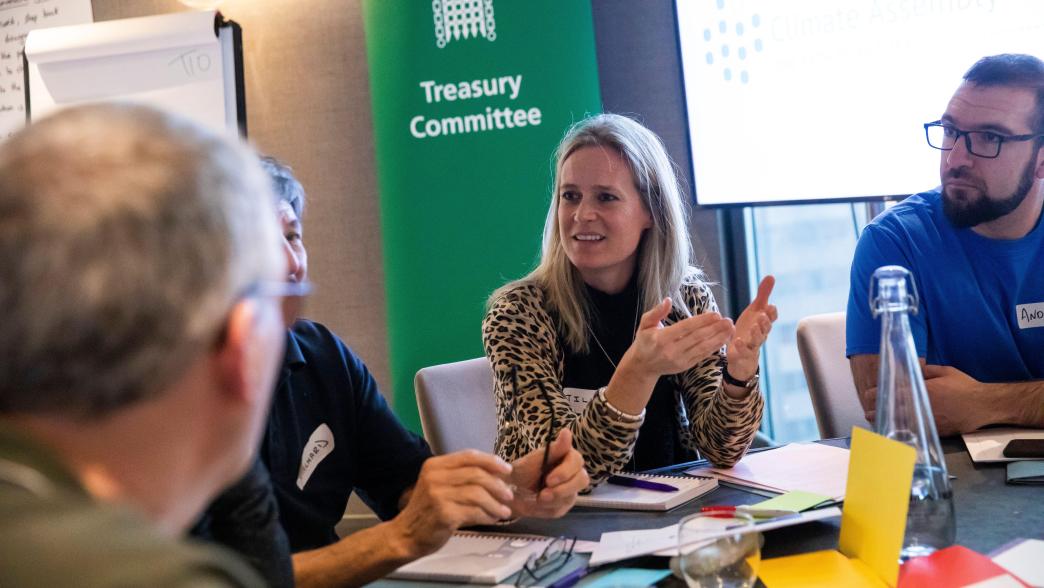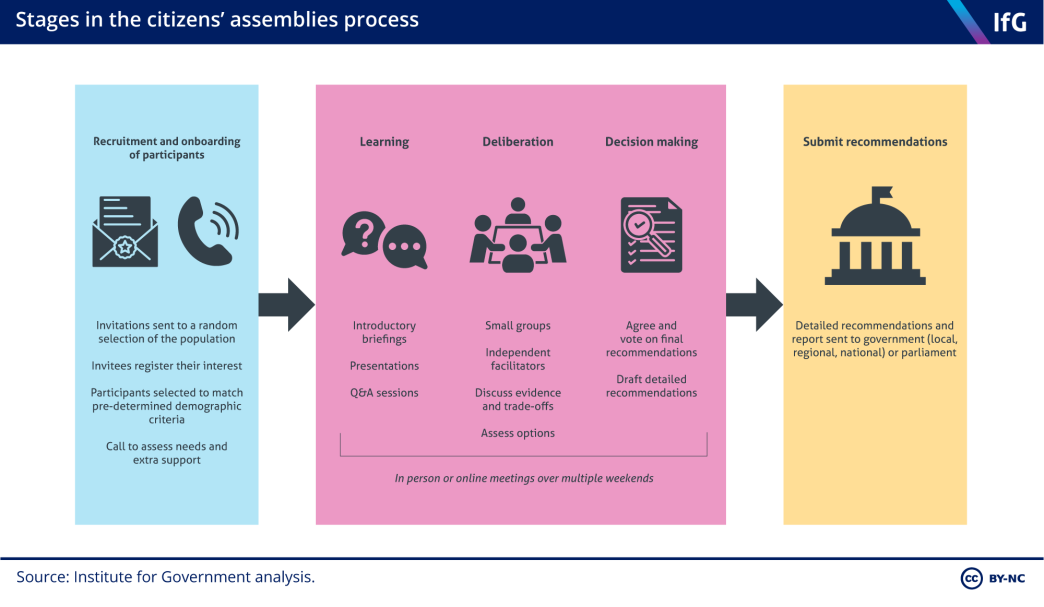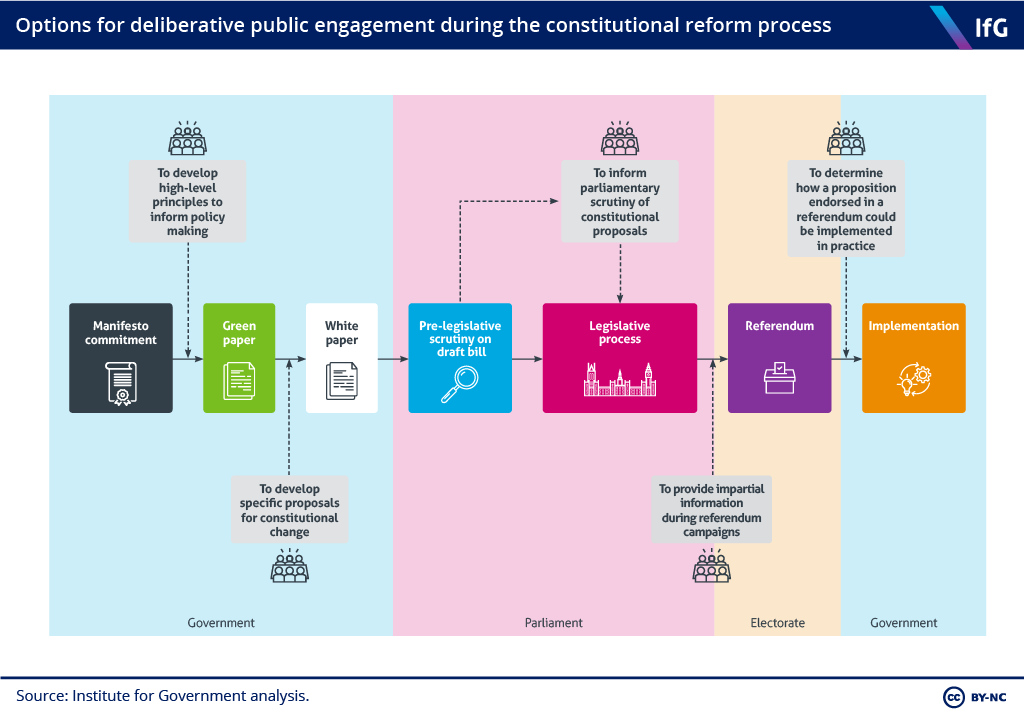Citizens' assemblies
What are citizens' assemblies and how do they work?

What is a citizens’ assembly?
A citizens’ assembly is a broadly representative group of around 50 – 150 members of the public who are chosen, by lottery, to discuss and make recommendations on a specific policy question or set of questions as part of the policy-making process. This model is one of many under the umbrella of deliberative mini public, which also include citizens’ panels and citizens’ juries. 48 www.involve.org.uk/resources/knowledge-base/what/deliberative-public-engagement
What is deliberative engagement?
Public engagement can take many forms. Participatory processes such as elections and referendums enable a very large group of citizens to directly take part in decision making. Deliberative processes focus on high quality dialogue and discussion, providing opportunities for fewer people to share and test their ideas before reaching an informed opinion or consensus on the topic. 49 www.citizenlab.co/blog/civic-engagement/whats-the-difference-between-deliberative-and-participatory-democracy/ Participants discuss the topic among themselves and are supported by professional facilitators to consider each others views and the trade-offs of different policy options.
These models – including citizens’ assemblies – are tasked by legislatures and governments around the world to engage with a wide range of issues, including constitutional reform, climate change, electoral reform, and social policy issues. 50 www.oecd-ilibrary.org/sites/339306da-en/index.html?itemId=/content/publication/339306da-en
How do citizens’ assemblies work?
Citizens’ assemblies have three core phases – learning, deliberation and decision making – which set them apart from other forms of public consultation such as focus groups and opinion polling.
- Participants are provided with detailed information – presentations and Q&A sessions – about the issue at hand from a range of experts, stakeholders, and advocates.
- They engage in discussions in small groups and plenaries, facilitated independently – not by the commissioning organisations – aiming to consider the range of evidence and understand the issue from multiple perspectives.
- The assembly members come to some conclusions based on what they have learnt.
Assemblies are often overseen by an advisory group with membership drawn from a range of perspectives and expertise. They will play a role in shaping the topic selection and materials used by the assembly members, to ensure as far as possible that participants are presented with accurate, comprehensive and balanced information. Information on designs, sessions, materials and presentations – but not discussions – may also be placed online to ensure there is transparency in the process.
An assembly usually meets over several weekends, across a few months, although the length of time varies for different assemblies.

What is the outcome of a citizens’ assembly?
The outcome of a citizens' assembly is typically a set of recommendations or decisions that are presented to policymakers and/or the wider public. The way that these are presented will vary, for example in Ireland there is a formal process whereby recommendations are sent to a dedicated parliamentary committee to consider and report to government. The government is not obliged to accept the recommendations but it sets a timetable for implementation and if it is not accepting any of the recommendations it has to say why.
Who sits on a citizens’ assembly?
Citizens’ assembly participants are chosen to reflect the wider population – a ‘mini-public’ – in terms of demographics such as age, gender, ethnicity and socio-economic status and may include other characteristics such as geographical location. Recruitment takes place through a process of random selection, or sortition. Once people opt in, a smaller selection are chosen who meet the balance of demographic criteria. During the onboarding process participants will be asked about any extra support they need to ensure they can attend and engage in the process. For example, support relating to accessibility requirements or caring responsibilities.
How have they been used across the world?
The OECD database of deliberative engagement cites 320 citizens’ assemblies and juries held since 1986 across local, regional and national levels. 59 airtable.com/appP4czQlAU1My2M3/shrX048tmQLl8yzdc/tblrttW98WGpdnX3Y/viwX5ZutDDGdDMEep?blocks=hide Citizens’ assemblies have been held in France on climate change and in Ireland on a range of constitutional questions. Citizens’ juries and panels, which tend to be smaller and held over fewer days, have been held in Belgium on genetically modified crops and in Finland on freedom of expression. 60 airtable.com/appP4czQlAU1My2M3/shrX048tmQLl8yzdc/tblrttW98WGpdnX3Y/viwX5ZutDDGdDMEep?blocks=hide These models differ in the amount of time they take, how much they cost and how many people are involved.
| Type of process | Total number held | Average number of attendants | Average number of total meeting days | Average number of weeks between 1st and last meeting | Average cost* | Countries used in at a national level |
| Citizens' assembles | 89 | 85 | 9 | 17 | £758,094 | Austria, Belgium, Canada, Denmark, France, Germany, Ireland, Luxembourg, Montenegro, UK |
| Citizens' juries | 231 | 46 | 5 | 9 | £83,932 | Belgium, Canada, Denmark, Finland, France, Portugal, South Korea, UK |
Source: Institute for Government analysis of OECD Database of Representative Deliberative Processes and Institutions 2023. Note: Cost calculations were not reported by all organisers so the figure is based on a smaller sample.
In the UK citizens’ assemblies have mostly been held by local authorities.
61
involve.org.uk/citizens-assembly-tracker
Larger citizens’ assemblies held in the UK include:
- In 2018 two select committees of the UK parliament sponsored a citizens’ assembly on how adult social care should be funded in England in the long-term. 63 publications.parliament.uk/pa/cm201719/cmselect/cmcomloc/citizens-assembly-report.pdf The assembly created and voted on a set of principles which they felt should inform how adult social care in England is funded and made a series of recommendations.
- In 2019 the then National Assembly for Wales held a citizens’ assembly, to explore how Welsh people can shape their future through the National Assembly’s work. 64 involve.org.uk/sites/default/files/uploads/docuemnt/Citizens%27%20Assembly%20of%20Wales%20%E2%80%93%20Final%20report.pdf
- From 2019-2020 the Scottish government ran a citizens’ assembly looking into the future of Scotland. The assembly agreed a ‘10-point vision’ for the country and a set of 60 recommendations for the government to take forward. 65 www.gov.scot/publications/research-report-citizens-assembly-scotland/pages/2/
- In 2020 six select committees of the UK parliament sponsored Climate Assembly UK, a national citizens’ assembly tasked with making recommendations on how the UK could meet its legislative target of net zero by 2050. 66 www.climateassembly.uk/index.html
What have people said about citizens' assemblies?
What have the parties said?
While citizens’ assemblies are becoming more popular in politics around the world, neither Labour nor the Conservatives have officially endorsed their use. In a recent interview Sue Gray, Labour’s chief-of-staff, suggested that Labour might use citizens’ assemblies to examine issues such as devolution, assisted dying and House of Lords reform. However, party officials have since indicated that this is not official party policy and stated that there are not concrete plans to introduce citizens’ assemblies if Labour wins the next election. 78 www.telegraph.co.uk/politics/2024/02/19/labour-backtracks-sue-gray-citizen-assembly-whitehall-keir/ Among the smaller parties there is more support for these deliberative processes. The SNP-led Scottish government ran a citizens’ assembly in 2019-20, and the Liberal Democrats’ 2019 manifesto included commitments to use citizens assemblies on the ethical use of technology and the climate. 79 www.libdems.org.uk/fileadmin/groups/2_Federal_Party/Documents/From_NB/Stop_Brexit_and_Build_a_Brighter_Future.pdf
What have parliamentarians said?
Lisa Nandy and Stella Creasy wrote a joint appeal for the use of citizens’ assemblies on Brexit arguing that the use of such models could “disrupt the bad habits that have come to characterise Brexit – kicking issues into the long grass, placing party interests over the national interest and assuming the public are unable to cope with hard choices". 80 www.theguardian.com/commentisfree/2019/jan/16/mps-brexit-citizens-assembly-lisa-nandy-stella-creasy
In 2018 Caroline Dinenage, then minister of state for care, acknowledged the importance of the “collaborative approach” of the citizens’ assembly on adult social care “which captures a number of important voices ion the subject of social care funding, not least the citizens’ assembly”. 81 hansard.parliament.uk/Commons/2018-07-02/debates/D5FD6CAF-590A-4152-9520-CE548CF2324D/DepartmentOfHealthAndSocialCareAndMinistryOfHousingCommunitiesAndLocalGovernment#contribution-9025C4C9-4D31-4475-B5DC-EFC26AE8B2AC
In the House of Lords, in 2022 Lord Brown of Ladyton, member of the Environment and Climate Change Committee, said that recommendations from the Citizens’ Assembly on Climate Change “is perhaps the best evidence we heard of the effect that education and knowledge can have in prompting individuals to make decisions for the collective good”. 82 hansard.parliament.uk/Lords/2022-10-20/debates/55261E3B-AA69-4F71-9A02-4F80AEC1C92A/Net-ZeroEmissionsBehaviourChange?highlight=%22citizens%27%20assembly%20on%20climate%20change%22#contribution-C4C0C73E-2FFA-41B1-8EAF-EC156F9D8C00
What do critics of citizens’ assemblies say?
Critics of citizens’ assemblies have raised concerns about how they might undermine the role of elected representatives or be used by politicians to ‘by-pass Whitehall’. 83 www.conservativehome.com/2024/02/19/an-arch-mandarin-like-gray-must-know-that-citizens-assemblies-only-enhance-the-bureaucracys-power/ Others have raised practical concerns about the cost, whether the membership can actually be representative and whether the process and the information participants receive will be impartial. 84 www.politico.eu/article/the-myth-of-the-citizens-assembly-democracy/
What do supporters of citizens' assemblies say?
Advocates argue that they are an effective way to approach important policy decisions if politicians feel unable to reach a consensus on the way forward. 85 www.instituteforgovernment.org.uk/sites/default/files/2023-09/Putting-citizens-at-heart-of-UK-constitution.pdf They are best suited to topics with no technical right or wrong answer such as assisted dying, constitutional matters and aspects of climate policy. 86 constitution-unit.com/2024/03/01/eight-key-questions-about-citizens-assemblies/ Others have suggested that they can be used to help overcome problems with trust and dissatisfaction with democracy. 87 involve.org.uk/news-opinion/opinion/citizens-assemblies-can-help-next-uk-government-tackle-big-problems-our-time#:~:text=When%20done%20right%2C%20citizens%E2%80%99%20assemblies%20can%20help%20rebuild,trust%20built%20between%20citizens%20and%20their%20elected%20representatives. In response to the concerns raised by critics, advocates argue that a well-designed process, good communication and willingness of politicians to engage can mitigate – although not eradicate – the risks. 88 www.constitution-unit.com/2024/03/01/eight-key-questions-about-citizens-assemblies/ www.involve.org.uk/news-opinion/opinion/citizens-assemblies-can-help-next-uk-government-tackle-big-problems-our-time
How could citizens' assemblies be used in the UK?
The Institute for Government and Bennett Institute for Public Policy Review of the UK Constitution proposed several models for embedding deliberative public engagement in the process of constitutional reform.

The review’s proposals included:
- Governments establishing citizens’ assembly to inform proposals for the constitution, recommendations could be further developed by government or parliament and then put to a referendum
- A citizens’ assembly being used, during a general election campaign, to enhance voter information ahead of a vote. Participants would weigh the options before a vote, flag claims they think are misleading, or ask for clarification on certain points or for more information before providing a summary to voters.
- Parliamentary select committees commissioning smaller scale citizens’ juries to inform parliamentary scrutiny.
Review of the UK Constitution: Final report
The UK constitution needs urgent reform to fix crisis of trust in UK politics.
Read the report
- Publisher
- Institute for Government